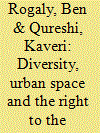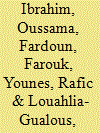|
|
|
Sort Order |
|
|
|
Items / Page
|
|
|
|
|
|
|
| Srl | Item |
| 1 |
ID:
123190


|
|
|
|
|
| Publication |
2013.
|
| Summary/Abstract |
Using three vignettes of the same physical space this article contributes to understanding of how the right to the city is contested in provincial England in the early twenty-first century. Oral history and ethnographic material gathered in Peterborough between 2010 and 2012 are drawn on to shed new light on the politics of diversity and urban space. This highlights the multiple place attachments and trans-spatial practices of all residents, including the white ethnic majority, as well as contrasting forms of active intervention in space with their different temporalities and affective intensities. The article carries its own diversity politics, seeking to reduce the harm done by racism through challenging the normalisation of the idea of a local, indigenous population, left out by multiculturalism. It simultaneously raises critical questions about capitalist regeneration strategies in terms of their impact both on class inequality and on the environment.
|
|
|
|
|
|
|
|
|
|
|
|
|
|
|
|
| 2 |
ID:
122714


|
|
|
|
|
| Publication |
2013.
|
| Summary/Abstract |
This paper presents a brief review of the conventional and renewable energy statuses, in Lebanon, as well as of the principal problems facing the electricity of Lebanon Company (EDL). In addition, an analytical-critical review of the latest three official Lebanese electricity plans is presented. Furthermore, two future electricity generation plan-scenarios for Lebanon are investigated, where multi variables are examined, namely: cost, environment and tariff. First, an economical-environmental optimization is carried out, where two reasonable scenarios are introduced based on the fuel source of CCGT power plants. Results revealed that the investment in wind energy and natural gas for power production should be a main concern in the future. Second, an optimization of the average electricity tariff for each of the two investigated generation scenarios is studied, where three different approaches are illustrated. Results confirm that all tariff plans are acceptable and convincing, and that the use of natural gas in CCGT plants is always preferred against gasoil. Moreover, the optimized average tariff is maximally a double of the current EDL average tariff, which is very convincing compared with the actual cost of electricity for the current Lebanese electricity sector.
|
|
|
|
|
|
|
|
|
|
|
|
|
|
|
|
|
|
|
|
|